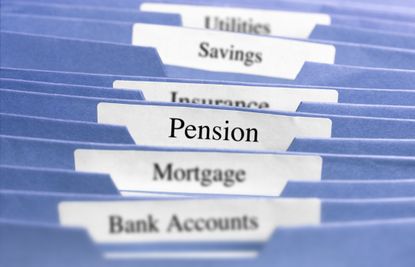How much state pension will I get?
The state pension is a vital part of retirement planning for many of us, but not everyone will be in line for the full amount. Here’s everything you need to know about how much state pension you will get.


A big question for anyone considering their income in life after work is: ‘how much state pension will I get?’
At £185.15 a week, which is less than £10,000 a year, the state pension won’t mean a life of luxury after you give up work, but it can be a valuable supplement to any personal private savings you have built up during your working years.
However, the state pension can be confusing, since not everyone will receive the same amount or any at all. Here we break down the important elements of the state pension that you need to understand, from what determines the amount you receive to the steps you can take to increase the size of your state pension payments.
What is the state pension?
The state pension is a payment made to people across the UK once they reach pensionable age.
The state pension is a universal benefit, which means that everyone gets it, irrespective of your financial position. However, the actual amount that you get can vary based on a range of factors, such as when you were born and your National Insurance record.
The state pension increases each year, courtesy of the triple lock. It’s a mechanism that was introduced by the coalition government, and ensures that the state pension rises whichever of the below is the largest.
- The rate of inflation
- The rate of wage growth
- 2.5%
The triple lock was suspended last year, as the sharp jump in wages following the pandemic and the end of furlough would have meant a 7% increase to the state pension. Instead, the wage growth element was removed, meaning that the state pension grew by 3.1%, which was the rate of inflation.
Look After My Bills Newsletter
Get the best money-saving tips, tricks and deals sent straight to your inbox every week. Make sense of your money in partnership with The Money Edit.
However, the government has pledged to keep the triple lock in place from this tax year onwards.
How much state pension will you get?
There are two different types of state pension in place at the moment; how much you get depends on what state pension you receive.
Basic state pension
We will start with the basic state pension, which is paid to those who reached state pension age before 6th April 2016. The amount you receive will be determined by how many years of qualifying National Insurance contributions you have ‒ this is essentially how many years in which you have paid such contributions, or benefited from National Insurance credits.
To get the full amount ‒ which stands at £141.85 ‒ you’ll need 30 years’ qualifying contributions or credits. If you have fewer years then you will receive a smaller basic state pension.
New state pension
Those who reach state pension age after 6 April 2016 will instead be eligible for the new state pension. You need 35 years’ qualifying years on your National Insurance record to receive the full amount of £185.15, and at least 10 years to receive anything at all. Again, if you have fewer years of contributions then you receive less.
HOW TO CHECK YOU STATE PENSION AND STATE PENSION AGE?
You can check your state pension and your state pension age via the government’s state pension forecast site.
See also our article on how to check your state pension to see if you are on track.
Who can get the state pension and when will you get it?
The state pension is paid once you reach state pension age.
At the moment the state pension age is set at 66, but is due to increase to 67 in 2028. It is kept under review, so is likely to increase further in the decades ahead.
So long as you have 10 years of qualifying National Insurance payments, then you will receive at least some level of state pension.
It’s important to bear in mind that the state pension is not paid to you automatically once you reach state pension age. Instead, you have to claim it.
A letter will be sent to you a couple of months before you reach state pension age, inviting you to do so. There are a host of different ways you can do so, such as through Gov.uk or by contacting the Pension Service.
Your state pension is generally paid every four weeks, and is paid in arrears. The day on which you will receive your payment will depend on the last two digits of your National Insurance number:
| Last two digits of National Insurance number | Day which the state pension will be paid |
|---|---|
| 00-19 | Monday |
| 20-39 | Tuesday |
| 40-59 | Wednesday |
| 60-79 | Thursday |
| 80-99 | Friday |
Can I boost my state pension?
If you do not have enough qualifying years of National Insurance payments, then you won’t be entitled to the full state pension. However, it is possible to correct this issue by making voluntary National Insurance contributions or applying for National Insurance credits.
You can generally only pay voluntary contributions for the last six years, while the type of contribution you need to pay will vary based on factors such as your employment status and income. The government suggests discussing your situation with the Future Pension Centre to ensure that you will benefit from these additional contributions.
An alternative option will be to apply for National Insurance credits. These are paid on behalf of people who are unable to make contributions for some reason, such as being unemployed, ill, on parental leave, or because they are caring for a loved one.
If you qualify for the full new state pension, then there is another way to boost the amount that you receive, and that’s by deferring the payment.
While you are eligible to receive the state pension once you reach pensionable age, you don’t have to take it at that point. If you defer those payments for a year or two, perhaps because you are still in full time employment and in good health, then the size of the payments you receive when you do claim the state pension will increase.
Your state pension will increase by 1% for every nine weeks you delay claiming your state pension, which works out at around 5.8% for each year you defer payment.

John Fitzsimons has been writing about finance since 2007, and is a former editor of Mortgage Solutions and loveMONEY. Since going freelance in 2016 he has written for publications including The Sunday Times, The Mirror, The Sun, The Daily Mail and Forbes, and is committed to helping readers make more informed decisions about their money.